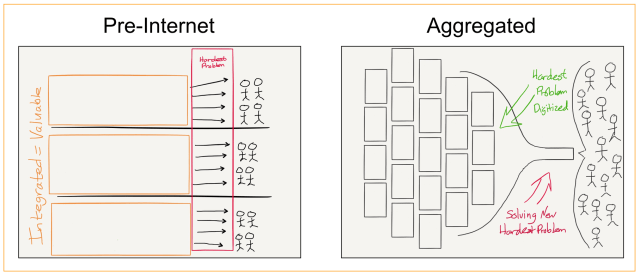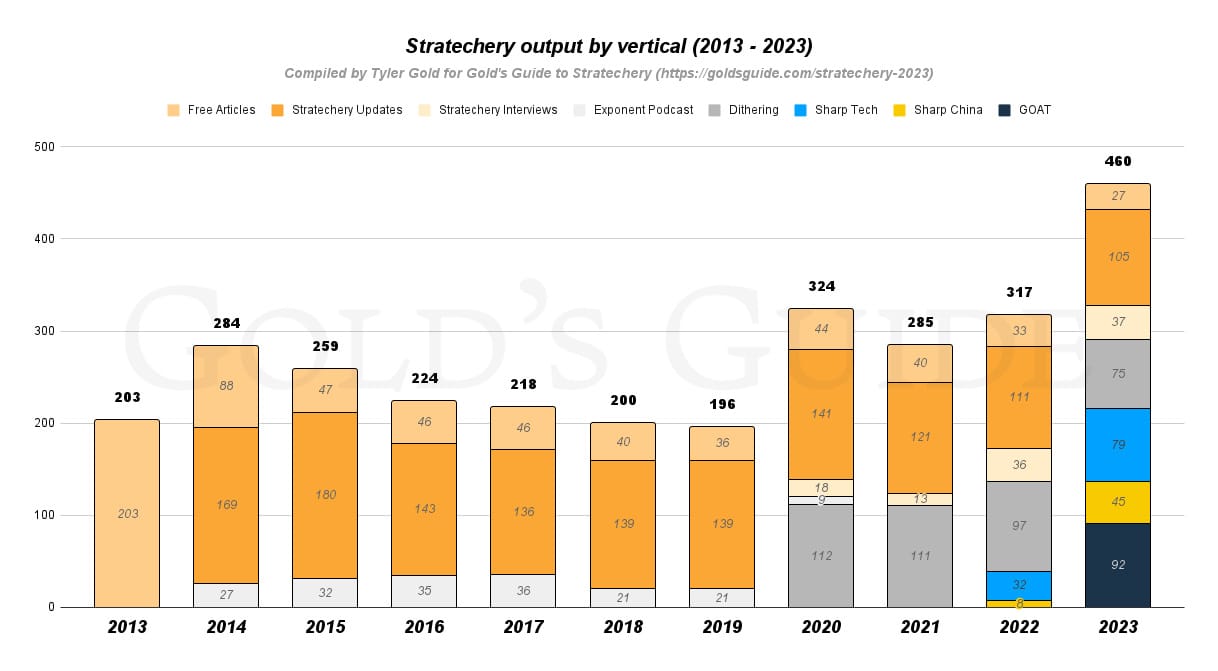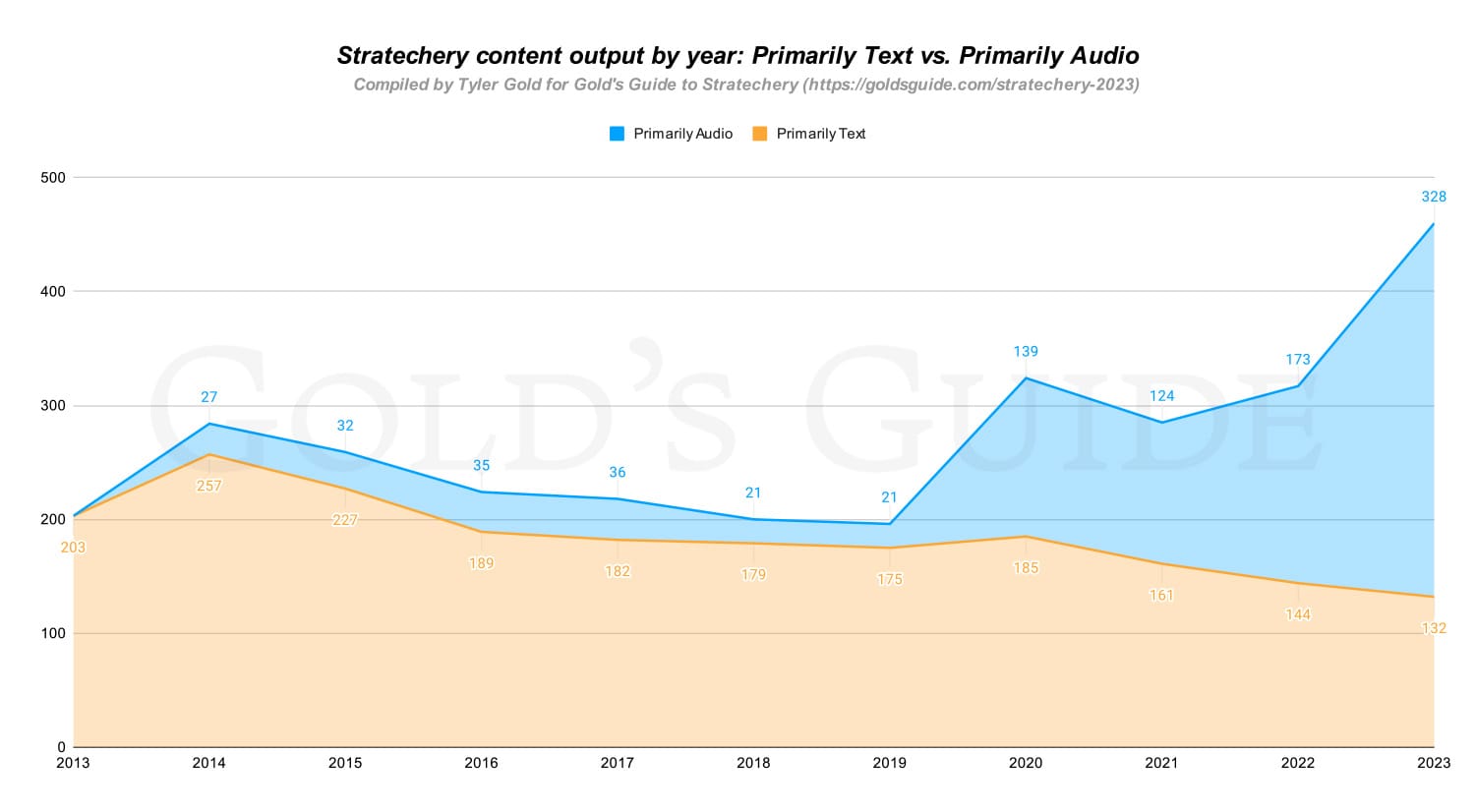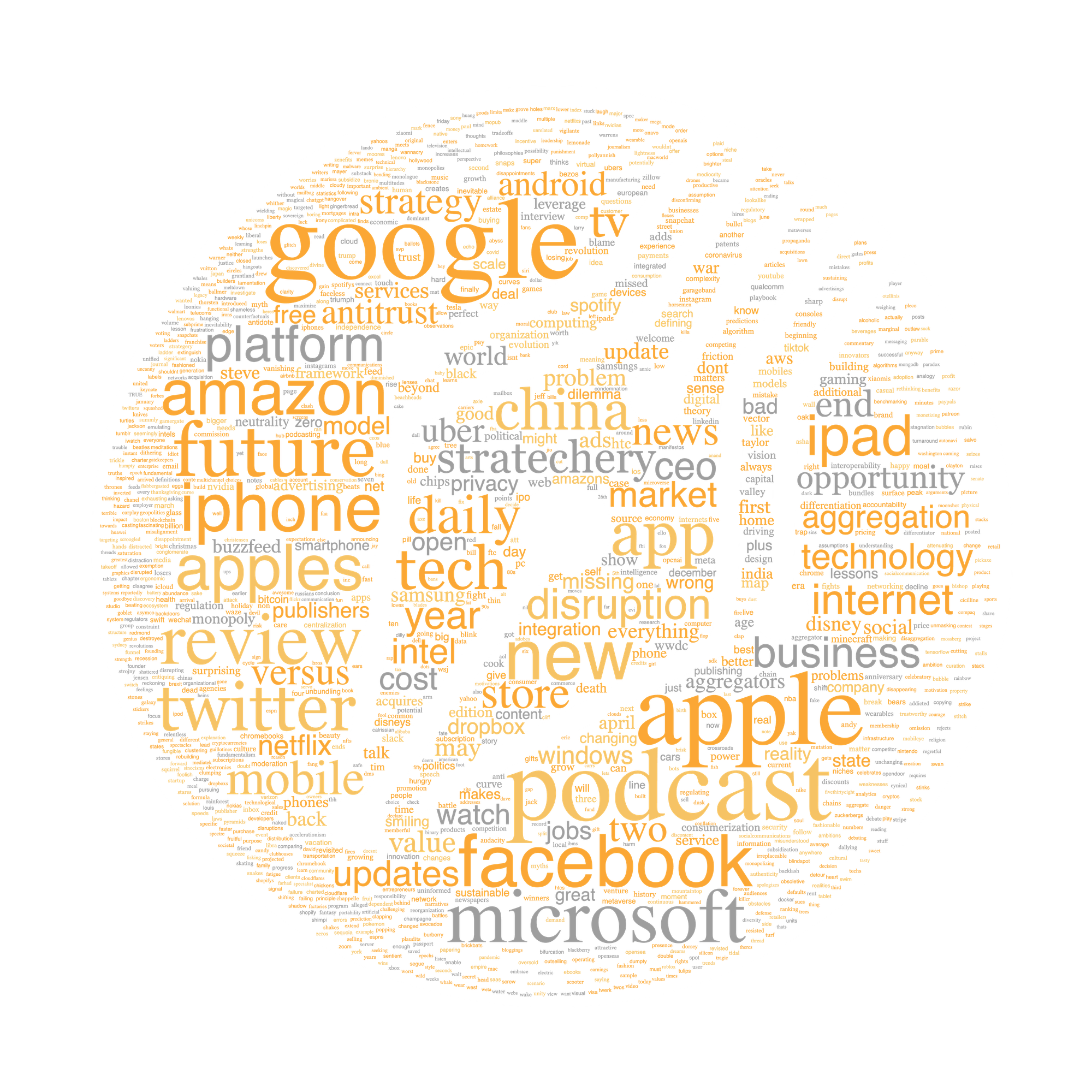It’s no secret that Ben Thompson was the primary progenitor of the paid newsletter — basically every media pundit recognizes his technology publication Stratechery as the inspiration for Substack.
His consistent and high-quality insights have cultivated a significant influence amongst the tech industry. Thompson has hosted interviews with prominent notable leaders including Meta founder & CEO Mark Zuckerberg and Microsoft CEO Satya Nadella — once he even interviewed both of them at the same time.
In the decade since launching Stratechery in 2014, Ben Thompson has independently established himself as one of the internet’s most credible sources for his insightful analysis of the business strategies leveraged by the world’s leading technology companies.
If major tech companies like Microsoft, Salesforce, and Adobe provide access to software as a service, then Stratechery provides access to content as a service.
The idea of paying $12 per month (or $120 per year) to read an email newsletter sounds crazy until you realize that you aren’t paying for an individual email. You’re paying for access to Ben Thompson’s consistent analysis of the latest developments impacting the tech industry. People pay thousands of dollars to access products like the Bloomberg Terminal for similar reasons.
Not only has Thompson been consistently accurate with his predictions and insights, he’s always quick to correct his (infrequent) mistakes. Knowing that Stratechery is entirely reader-supported only further validates the trust inspired by the quality of his analysis — it proves there are thousands of other Stratechery readers who have aligned incentives.
Compared to advertising based business models, which almost always end up incentivizing high quantities of content output, this independent, reader-funded model incentivizes quality.

As the business has grown, Thompson has continued to innovate with his distribution methods: Stratechery content is essentially medium agnostic. Text articles can always be read on the Stratechery website or via email, but subscriber-content is also available as a podcast where Thompson narrates each new post.
This is interesting in theory and fantastic in practice. Because the content meets me where I am, reading or listening to Stratechery is one of the most convenient experiences in digital media. In retrospect, this method was so obvious that Substack followed suit once again.
In the years since introducing the audio posts and an interview series, Stratechery subscriptions have started including access to additional podcasts. The first podcast was Dithering, which Thompson co-hosts with the renowned Apple pundit John Gruber. Then, he launched Sharp Tech with the indomitably calm Andrew Sharp, who now co-hosts two more shows included with a Stratechery subscription... which Thompson doesn’t appear on. If you squint, Stratechery is starting to look like a media company.
Every now and then, a critical framework emerges to help us understand the ebbs and flows of the economy. In these regards, Ben Thompson’s Aggregation Theory is a spiritual successor to Clay Christensen’s seminal Theory of Disruptive Innovation.
Where Christensen’s famous Theory of Disruptive Innovation describes how Davids take down Goliaths, Thompson’s Aggregation Theory describes how Davids become Goliaths.
Like Christensen’s theory, Aggregation Theory might feel a bit counter-intuitive at first, because the internet has completely changed the classical tug-of-war between supply and demand. As described by Thompson, with pre-internet businesses “there have always been far more users/consumers than suppliers, which means that in a world where transactions are costly owning the supplier relationship provides significantly more leverage.”

Owning a hotel or printing a newspaper is something only a relatively small number of suppliers are capable of doing. Because they controlled supply they could influence demand, and they reaped the majority of the rewards. According to Thompson, “the fundamental disruption of the internet has been to turn this dynamic on its head.”
Now, instead of calling a cab service, we call Uber; instead of finding a local bed and breakfast we go to Airbnb. Instead of going to the library, we search Google. Who needs to go to the store when it’s probably cheaper on Amazon?
These companies all have one thing in common: they aggregate goods from a relatively small number of suppliers and then conveniently package it for consumption by a massive audience. This is no simple task — the few companies that have properly leveraged the ideas described by Aggregation Theory have become some of the most successful businesses in history.
Recommendations
- Acquired podcast interview with Ben Thompson (📺 YouTube, 2021)
- Tim Wu says Stratechery is "smart, but a little too much Kool-Aid" (📖 Medium, 2020)
- Andreas Stegmann analysis of Stratechery business (📖 Medium, 2020)
- Announcing Dithering, An Interview with John Gruber (📖 not about Apple) (Stratechery, paywalled, 2020)
- Ben Thompson speaks about platforms vs. aggregators (YouTube, 2018)
- Ben Thompson explains the great unbundling (YouTube, 2017)
- Blogging’s Bright Future (📖 Stratechery, 2015)
- Felix Salmon interviews Ben Thompson (📖 Medium, 2014)
- 1,000 True Fans by Kevin Kelly (📖 KK.org, 2008)
- Tim Wu says Stratechery is "smart, but a little too much Kool-Aid" (📖 Medium, 2020)
- Andreas Stegmann analysis of Stratechery business (📖 Medium, 2020)
- Announcing Dithering, An Interview with John Gruber (📖 not about Apple) (Stratechery, paywalled, 2020)
- Ben Thompson speaks about platforms vs. aggregators (YouTube, 2018)
- Ben Thompson explains the great unbundling (YouTube, 2017)
- Blogging’s Bright Future (📖 Stratechery, 2015)
- Felix Salmon interviews Ben Thompson (📖 Medium, 2014)
- 1,000 True Fans by Kevin Kelly (📖 KK.org, 2008)
Image Sources
- Stratechery logo (x.com)
- Stratechery Plus logo (stratechery.com)
- Stratechery Interviews logo (stratechery.com)
- The Moat Map (stratechery.com)
- Ben Thompson at a conference in 2016 (Thor Brødreskift / Nordiske Mediedager, wikimedia.org)
- Aggregation Theory (stratechery.com)
- Sharp China logo (sharpchina.fm)
- Dithering logo (dithering.fm)
- Sharp Tech logo (sharptech.fm)
- Wordpress logo (wordpress.org)
- Passport logo (stratechery.com)


Table of Contents

Bio
Ben Thompson: author and founder of Stratechery. Thompson previously interned for Apple, then worked at Microsoft (where he started writing Stratechery as a side project), and then had a brief stint at Automattic — the company behind Wordpress, the CMS he uses to publish articles — before shifting to writing Stratechery full-time in 2014. Thompson lives in Taipei, the capital city of Taiwan.
Key People
Andrew Sharp: the namesake host for two podcasts in the Stratechery ecosystem, Sharp previously wrote about the NBA for Sports Illustrated, where he co-hosted the Open Floor NBA podcast with Ben Golliver. In 2020, following pressure from Thompson, Sharp and Golliver launched a paid podcast called The Greatest Of All Talk (aka “The GOAT”), which was added to the Stratechery Plus bundle in January 2023. Sharp lives in Washington, DC.
Daman Rangoola: helps produce the various Stratechery podcasts and reads blockquotes from third-party sources in the podcasts narrating Stratechery articles and updates.

John Gruber: co-host of Dithering, better known as the author and founder of Daring Fireball. Gruber is one of the most influential personalities in the technology space, highly regarded for covering Apple and its various products for over 20 years. Gruber lives in Philadelphia, PA. Thompson has mentioned that Gruber was his “chief inspiration” for Stratechery. (Read Gold’s Guide to Daring Fireball for more)

Bill Bishop: co-host of Sharp China, also the independent author and founder of Sinocism, one of the top paid newsletters on Substack. He previously co-founded Marketwatch, which was sold to Dow Jones for over $519 million in 2004. Bishop spent over a decade living and working in China, and currently lives in Washington, DC.
Ben Golliver: co-host of The GOAT podcast and national NBA writer for the Washington Post since 2018, Golliver has covered basketball for over a decade. In 2021 he published his first book, “Bubbleball”, which chronicled the 93 days Golliver spent quarantined in the NBA's Disney World bubble during the 2019-2020 season. Golliver lives in Los Angeles, CA.
Products
Thompson publishes content to Stratechery in three primary formats:
- Stratechery Articles (free) — average 3,000 words
- Stratechery Updates (members only) — average 1,500 words
- Stratechery Interviews (members only) — average 45 - 60 minutes
Members also get access to audio versions of Thompson’s writing, which he narrates himself. He’ll occasionally open subscribers-only content up to the public if something particularly noteworthy happens.
The twice monthly Articles are free, long-form columns discussing the most important tech and media news of the moment; or they’re deep, philosophical pieces reflecting on the overall trends of the market. The free Articles serve as a top-of-funnel for new subscribers to enter the Stratechery paid ecosystem.
All Stratechery content is available in text and audio formats — with video possibly coming in the future, according to Thompson on his various podcasts.
Major themes on Stratechery include explorations into the rise of artificial intelligence, earnings analysis of the major tech companies; the burgeoning GPU market, the economics of semiconductor manufacturing, and the state of the media business.

Stratechery Update
The Stratechery Update is Thompson’s main product, providing in-depth analysis of significant current events in the tech and media industries three times per week. The Update is available online, via newsletter, or as a podcast.

Stratechery Interviews
Stratechery Interviews are a relatively new format where Thompson hosts long-form conversations with prominent executives like Disney CEO Bob Iger, founders like Amjad Masad of Replit, Eugenia Kuyda of Replika, and analysts Eric Seufert and Matthew Ball. Most journlaists would be happy to interview either Satya Nadella or Mark Zuckerberg, but in 2022, Thompson interviewed both of them at the same time.
The Stratechery Plus Podcast Bundle
At the height of covid-19 lockdowns in May 2020, Thompson announced a new podcast in collaboration with John Gruber. The new show was called Dithering, and it would end up becoming the first of a family of podcasts.
Dithering quickly grew to 6,000 paid subscribers in about a month and crossed the 10,000 subscriber milestone in August of 2020.
After the launch — and success — of Dithering, Thompson launched several other podcasts as the Stratechery Plus bundle. This bundle includes the Updates and Interviews mentioned above (available in text or audio format), plus Dithering and a few new podcasts.

Dithering
A twice weekly podcast about technology, mostly; the name refers to the process of adding white noise to an image or sound, and to the hosts’s strong but loosely held opinions. Co-hosted by Ben Thompson and John Gruber. Each month, Dithering refreshes its album artwork.

Sharp Tech
A podcast about technology and its impact on the world, hosted by Andrew Sharp and Ben Thompson, who serve as foils for each other; Sharp as host and Thompson as the expert. Episodes run between 45 minutes and an hour.

Sharp China
A podcast about understanding China and their impact on the world, hosted by Andrew Sharp and Bill Bishop, author of the popular Sinocism newsletter. The coverage compliments that of Stratechery, which frequently covers how China impacts the global economy. Each episode runs around an hour.

Greatest Of All Talk
An podcast dedicated to the NBA (Thompson’s favorite sport) hosted by Andrew Sharp and Ben Golliver, also available separately from the Stratechery Plus bundle.
Passport
Stratechery originally distributed its content via email, a great format for delivering text articles — but not for podcasts, which listeners discover and consume in apps like Spotify, Apple Podcasts, or Overcast.
Instead of using an off-the-shelf podcast hosting tool like Libsyn or Anchor, in 2021, Thompson introduced Passport, a proprietary distribution service which enables readers to consume Stratechery Plus content in the form that is most fitting for their needs.
Passport provides options to get text message notifications, emails, or both when new content is published; it also creates dedicated RSS feeds for text and audio content.
RSS is one of the few open standards on the internet besides for email and websites. It’s also the foundational technology used for hosting podcasts on every platform except for Spotify. Podcasts are distributed via RSS feeds, which enables publishers to host podcasts on the platform of their choice; and enables consumers to listen on any app.
One of the tenets of subscription-based businesses is that you want to have a one-to-one connection with your users; the reality of Stratechery previously is that I had a relatively dumb paywall, was sending out undifferentiated email blasts, and had a one-size-fits-all podcast. Passport enables true one-to-one communication at scale, across every open protocol available to creators.





Passport creates a unique feed for each subscriber, which also enables a subtle luxury feature: when I click a link in the show notes of a Stratechery podcast to read the article, it automatically logs me in, because it knows it’s me:
Notice that the user is viewing subscriber-only content within their podcast player, despite the fact they never previously logged-in within that webview; that is because every link is unique to that user, making the integration with the Stratechery website completely seamless. This capability also means that every communication, from podcasts to RSS to email, can be customized to the user.
Compared to, say, The New York Times — which frustratingly forces me to separately enter my username and password for each app on every device I use — Passport provides a more seamless authentication experience that allows me to click a link and instantly read what I’m looking for.
Content Analysis
Thompson has a tradition of publishing a year in review article covering the major topics and themes of the past 12 months.

There’s been an increasing amount of audio content following the introduction of Dithering in May 2020. The GOAT Podcast has technically been in existence longer but it wasn’t officially added to the Stratechery Plus bundle until 2023, so it doesn’t appear here until then.
As Stratechery has matured, the business has become more prolific — even as Thompson himself writes less.

Podcasting is much easier than writing, and Ben doubled down on audio content in 2023.

When considering the fact that all of the Stratechery text content is also available in audio form, the future of the business clearly appears to be more paid podcasts, probably as part of an expanding bundle.
The topics covered on Stratechery have been consistent over its 11-year lifespan. The most ten common proper nouns used in URLs for free Stratechery articles (not including update or podcast titles) are:
- podcast
- Apple
- Stratechery
- future
- review
- new
- iPhone

Origin Story

Launching a solo business is not easy. Thompson discussed the origin story of Stratechery in detail in a fantastic interview with the Acquired podcast from 2021, where he described his initial challenges:
I launched Stratechery. Again, the idea was you would log in [to the website, and] you get this much fuller experience. I launched it and there's something wrong with the security certificate. The first 24 hours, no one can make a purchase.
I'm up for 36 hours straight. I barely slept for the week before, finalizing the site. I stupidly had reached out to Kara Swisher at Recode. She had a pre-scheduled post that's going to announce that it's going to be paid. I had this stupid artificial deadline that made zero difference other than stroking my ego. It was awful. It was a horrible experience.
The worst thing was the product sucked. It was super confusing. I didn't achieve my goal of having a good experience for non-paying customers that was ideally to lure them in. For paying customers, it didn't work well. It was very janky and it sucked. It was really, really bad.
Over the weekend, I'm just miserable. I know I screwed up, and I burned my bridges and all these things. I realized that I messed up. The business model is right, the product is wrong. [...] I tore the whole thing out and I went back to the old website.
I told the people that subscribed, I appreciate you subscribing; the format's all wrong. What I'm going to do is for your subscription, I'm just going to email you. I'll email you once a day with the extra stuff that I promised you.
I fell completely and utterly ass-backwards into email. I [originally] thought [all of my content] would all be on the website.
While the original idea was to launch Stratechery as a “product” — where readers actively seek out the website and then log-in for a full experience — failed, Thompson reverted to email, the most simple solution. Regarding Ben’s original insight into the market opportunity of paid newsletters:
Subscriptions did exist (I think) on Wall Street in particular, but they were generally like $20,000. You would get all the hedge funds to subscribe, and the banks. That model still exists and is actually a very, very profitable one. What I do think Stratechery innovated was subscriptions at scale, where you're charging a low price relative to $25,000 or $10,000. You're doing it on a self-serve basis. People sign up with their credit card.
Thompson points out that while the renowned Andrew Sullivan launched a paid newsletter called The Daily Dish, the business model was right but the content model was not. Stratechery opted to publish far less content than Sullivan did, ensuring that paid content was always additive to reader experience:
Actually, the real pioneer, who I should mention was Andrew Sullivan, had this manic posting schedule, like tens of posts a day. He didn't have a team to help him with the Daily Dish. He switched to a subscription when I think he left The Atlantic. It was successful. He quickly was doing a million dollars in revenue a year. He maintained that manic posting schedule that made sense in an advertising driven world where you want people always coming back and getting lots of impressions. The paywall was super loose. It was like 30 posts, and then you hit a paywall or something. The reality is what happened was he burned out. I think he had some health issues, and he ended up leaving.
Avoiding burnout is the most important consideration for a solo founder. When Sullivan quit writing The Daily Dish, most of the media thought that blogging was dead — but Thompson had a different point-of-view:
It was funny because when he left, everyone's like, blogging is dead, it's finished, it was a failure. I looked at him and I thought, I think this was actually a huge success. One of the problems was he had this posting schedule and system, and then he tried to drop a paywall on top of it. When I thought about Stratechery, I wanted to do the opposite, where I wanted a subscription to not feel like from a customer perspective that I was taking stuff away, but that I was giving them more just from a psychological perspective.
Thompson stuck with it and kept writing until he reached the first major “step change” moment in Stratechery’s growth trajectory — when Daring Fireball, which boasts between 60,000 and 80,000 page views on the average week day — linked to Stratechery:
I had waited to email John for the same principles at the beginning. I wanted to have a body of content, not just like an introductory post and say, oh, check out my new blog. How many emails does he get about that?
I waited a couple of months or a month or so. I emailed him and said, hey, been a big fan. He had just been on a podcast telling his origin story. He also worked on the student’s paper and XYZ. I shared that. I'm really related to this. I regret not doing what you did back in 2003, but I'm giving it a shot now. Here's a few articles, hope you're interested, and I heard nothing back. No response.
[…]
A couple of weeks later [...] I get an email from him pointing out that I'd made a grammatical error. I think it was something like jibe, jive, gibe. I use the wrong one, and he's like, I make this mistake all the time. He's telling me the etymology of each one, and that's all the email said.
I thought he's probably going to post the link to the site, so I was very excited. I'm sitting on the analytics page, and I'm [watching] Daring Fireball, and see what he will post. I was hoping for just a short link. He has all those short snippets.
Instead, it's a full article. He starts out saying, all my readers should be reading this new site that I've discovered, of course. It's called Stratechery. It's the best news site I've encountered in years.
He's like, this article, this article, this article. It's like 500 words of just the most glowing praise imaginable, and he gets to the end, and he's like, but for the first time, I disagree with Thompson, and then he spends another thousand words saying I was wrong about something. Which was fine. I think he was wrong.
That was the first big inflection point; and the beginning of a spirited friendship between Thompson and Gruber.
The even bigger inflection came a few months later, when Thompson announced he crossed the 1,000 subscriber milestone:
What happened was in November, I put a little post out. First I simplified my model. I said no more of this $300 level, cheap level, one price and one product. That's all you're getting. Then number two, I'm like, I got a thousand subscribers, business model works, this is definitely going to be my job going forward. In the next 24 hours, I got 250 new subscribers, by far, the biggest step change in my subscriber growth.
The idea is simple: if you can earn $100 per fan each year, you can put together a $100,000 salary.
Once his audience saw that Thompson had made it to 1,000 paying members, they decided the business was secure enough for them to subscribe.
The majority of Stratechery’s early growth was enabled by the app that was at the time called Twitter. The formula was intuitive and benefited everyone involved.
- Come up with a valuable perspective or insight, write it as an essay, publish it on a website (vastly oversimplified, but you get the gist).
- Share an interesting tweet and link out to the website as a source for additional information.
- If people find your idea valuable, they’ll retweet you or share a quote and a link to your website on their profile to portray themselves as a curator of valuable information.
- Let the audience do the hard work of marketing for you.
- Wash, rinse, repeat.
Despite having over 230,000 X followers at the end of November 2023, Thompson is not nearly as active on the platform as he once was — an oft-discussed topic on the various Stratechery Plus podcasts. Now that he’s built an audience and a reputation, Thompson can comfortably rely on word-of-mouth recommendations from his subscribers as a growth mechanism.

Competitive Advantages
- Stratechery consistently publishes compelling content that is differentiated from its peers by its high-quality insight. Once he had cultivated a significant influence, he launched an Interview series to reinforce his reputation, despite a lack of institutional reinforcement. Each additional interview adds to a sort of inertia that encourages new guests to join (“If Zuck, Nadella, and Iger were all on Stratechery, then must be legit”).
- Shifting content output from primarily text to mostly audio means that Thompson can publish more content with less effort — it’s considerably easier to record a podcast than it is to write and edit a comprehensive article.
- Thompson’s openness to acknowledging mistakes — and the fact that he has legions of avid readers chomping at the bit to tell him what they think — has helped him build a useful feedback mechanism where he invites subscribers to email constructive criticism and then responds to the best takes. Sharp Tech has an entire “mailbag” segment dedicated to this.
- Rather than being a snapshot of one moment in time, Stratechery is a constantly evolving documentation of the market’s ebbs and flows. Each article serves as an individual piece of a broader thematic whole, enabling broader themes like Aggregation Theory to naturally materialize over time.
- Living in Taiwan provides Ben with a time-zone publishing benefit, since he’s 13 hours ahead of the US east coast and can write articles while most Americans are sleeping. It also grounds his unique perspective on semiconductor manufacturing, which he frequently writes about — TSMC, the most advanced semiconductor manufacturer in the world, is also based in Taiwan.
- Having more annual subscriptions than monthly subscriptions significantly reduces Stripe fees, one of Stratechery’s biggest costs, and provides the entire year’s subscription payment at once. This means that Thompson has the liquid cash necessary to invest in developing new technology infrastructure, launch additional podcasts, and hire an administrative team.
- In contrast to the increasingly popular “build in public” mindset — where entrepreneurs openly share financial information as a marketing tactic, Thompson keeps the majority of Stratechery’s business details private.
- Stratechery has published top-quality analysis at a prolific rate for over a decade, which has led subscribers of Stratechery to view Thompson’s content as a service that they can use to inform business decisions. Thompson spent years building Stratechery, and put a considerable amount of time and effort into the initial launch and subsequent takeoff of the business. A lot of the success of the business is due to Thompson’s dedication to the grind: you have to really love what you do in order to be as prolific as Thompson.
